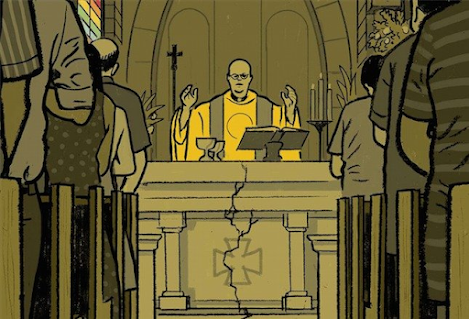Speaking to those who spend time and effort explaining things to people in the pew about what is and is not correct, defensible, indefensible, and so on, especially in terms of Canon Law, and indeed to explainers and apologists in general; with an eye to overturning default assumptions and subconscious biases.
I have a question.
If your view of Canon Law leads you to spend a lot of time criticizing and even attacking those who work towards this...
... feeling anguish over, and a strong urge to correct, their putative lack of a meek spirit of obedience towards the rules that loom so large in your vision, when they seek this:
... and not much time at all on those who inflict this...
... turning a blind eye or in general, indifference or a neutral attitude, to what the institutional hierarchy benignly supports, which seems to be a lot of this...
... and this..
... what are you doing with your lives, your expertise? When you are moved to chastise someone in your remarks, or to dismiss as hopelessly disobedient, in which direction to you tend to go?
What is Canon Law for?
"Neither the Code nor the educational regime of canon lawyers authorizes a canonist, as a canonist, to pronounce on matters of Church doctrine. Canon lawyers are not theologians, moralists, psychologists, or pastoral planners. They are lawyers. This is an important point, all the more so because canonists are sometimes apt to forget it themselves." [emphasis mine]
Hint:
The Code is in no way intended as a substitute for faith, grace, charisms, and especially not for charity*, in the life of the Church. On the contrary, the purpose of the Code is to create such an order in the Church that, while giving primacy to love, grace, and charisms, it at the same time renders their entire development easier, both for the ecclesial society and for the individual persons who belong to it. (Pope John Paul II)
*charity:
"I am aware of the ways in which charity has been and continues to be misconstrued and emptied of meaning, with the consequent risk of being misinterpreted, detached from ethical living and, in any event, undervalued. In the social, juridical, cultural, political and economic fields — the contexts, in other words, that are most exposed to this danger — it is easily dismissed as irrelevant for interpreting and giving direction to moral responsibility. Hence the need to link charity with truth not only in the sequence, pointed out by Saint Paul, of veritas in caritate (Eph 4:15), but also in the inverse and complementary sequence of caritas in veritate. Truth needs to be sought, found and expressed within the “economy” of charity, but charity in its turn needs to be understood, confirmed and practised in the light of truth. In this way, not only do we do a service to charity enlightened by truth, but we also help give credibility to truth, demonstrating its persuasive and authenticating power in the practical setting of social living. This is a matter of no small account today, in a social and cultural context which relativizes truth, often paying little heed to it and showing increasing reluctance to acknowledge its existence." (Pope Benedict XVI) [emphasis mine]
Addendum, with a further question. Still speaking to canon lawyers/online pundits who cling to their legalistic viewpoint, aimed overwhelmingly at the orthodox: Does this, Weaponized Catechisms, not trouble you at all -- changes to the Catechism to undermine trust in perennial teaching? Where are your published concerns on these matters? What occupies your time and energy?
Again, what is Canon Law for?
The last line of the last code tells us: "...and the salvation of souls, which must always be the supreme law in the Church, is to be kept before one’s eyes (...et prae oculis habita salute animarum, quae in Ecclesia suprema semper lex esse debet.)" Code of Canon Law, Canon 1752







Boom, you nailed it. What an awesome post! Thank you.
ReplyDeleteThank you!
DeleteThank you!
ReplyDeleteLove your comments and especially your links to the documents and articles you referenced. It was great to follow along with you.
ReplyDeleteOutstanding.
ReplyDeleteThere are also plenty of people, of course, who toss out canons like Caesar tossing coins into a crowd, without actually having any training in canon law. I should think real canonists would find that...well...annoying. As a secular lawyer myself, I know I find it annoying when people do that with the secular law.
Some of the most legalistic people I know blithely ignore the number one rule about rendering legal opinions, which is that first, you have to be qualified to do so.
Spot on! Thank you for this!!
ReplyDelete